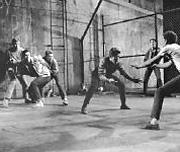The noises filling the backyard of my parents’ house, cradled in the Blue Ridge Mountains, are unfamiliar. The first to greet me this morning was two crows arguing; following the volley of their cries, I imagined cartoon magpies Heckle and Jeckyl holding court in the trees. Now countless birdsongs punctuate the lazy, humid afternoon. I hear buzzing bumblebees and unseen cows lowing over the ridge, but no cars or people or screeching modems.
I feel like Eva Gabor in the opening credits to Green Acres. I’m a city boy. I don’t belong here. And yet this is where I must be, because my brother also makes his home in this corner of Southwestern Virginia, and tomorrow I’m best man at his wedding.
My family moved to Boones Mill after I’d gone away to college. When I visit, which is rarely, I am confronted with the furnishings of my childhood, albeit in foreign surroundings. Here is the piano on which I learned to play “The Entertainer” at lightning speed and The Good News Bible I received one birthday and never cracked open. The rooms and shelves where these objects reside are recognized but unknown, like places in dreams.
The guests invited to the wedding, many of whom I’ve not seen in 20 years, have undergone a shift, too. My favorite aunt, who was once never without a cocktail, is on the wagon. Nieces and nephews I remember as wide-eyed babies have matured into teenagers and even parents. Stumbling into the kitchen for coffee, I’m greeted by the former pastor of the church we attended in my youth. What is the correct form of address, I wonder, now that we’re both grown-ups? Father Bayfield—or rather, Ralph—chuckles. “You can call me anything . . . just don’t call me late for dinner.”
While everyone is out running last-minute errands, I flip through my CD wallet: Paul Van Dyk, Old 97’s, Rocket from the Crypt. My sense of displacement escalates. This music seems as inappropriate in my parents’ house as Day-Glo camouflage pants, gay porn, and Knob Creek—all things I take for granted in my own home. What can I listen to that won’t disrupt the fabric of their universe?
I find an answer in my father’s LP collection: the original 1957 Broadway cast recording of West Side Story. This musical profoundly shaped my sensibilities. The first time I watched the film on TV, I cried myself to sleep. Years later, my parents were thrilled when I told them I was performing at composer Leonard Bernstein’s 75th birthday celebration. Any time my job on the Great White Way brought me in contact with West Side alumni like Hal Prince, Stephen Sondheim, or Chita Rivera, I made sure mom and dad knew.
But unbeknownst to my folks, I also sang “A Boy Like That” alongside a zaftig drag queen in a dingy East Village club not long after I arrived in New York. What would they have thought of that? Could they have reconciled encountering something as familiar as their oldest son singing show tunes with the grimy locale of Alphabet City and an audience filled with drug dealers, muscle boys, and freakish club kids?
The first time I saw the recent Gap ads based on West Side Story, I reacted as violently as I imagine my parents might’ve if they’d wandered into the Pyramid on that fateful evening. But my position has softened. According to Entertainment Weekly, those Volkswagen commercials featuring “Pink Moon” have pushed weekly sales of Nick Drake’s album of the same name from roughly a hundred copies a week to as many as 1,858. If the Gap using “Cool” and “America” does the same for West Side Story, I’m thrilled.
One of the hardest ideas for some artists to accept is the lack of control they have over their work once it enters the public sphere. Lenny didn’t write “The Dance at the Gym” to hawk khakis, but his music retains its percussive punch regardless. When my folks drilled into my head the importance of saying “please” and “thank you,” they never anticipated my good manners serving me just as well with domineering leather daddies as at the Bon March鮍
Dancing around my Mom’s unfamiliar kitchen to “Somewhere,” I realize that what’s important isn’t so much where people or things wind up as what they bring with them. So I’m not married in the suburbs with two kids the way my family planned. That’s no reason to feel estranged. I will forever carry the impressions left on me by these familiar objects and individuals, just as surely as my dad scribbled his initials on album jackets to signify ownership. Though I live across the country, the fruit—as it were—hasn’t fallen so far from the tree after all.






